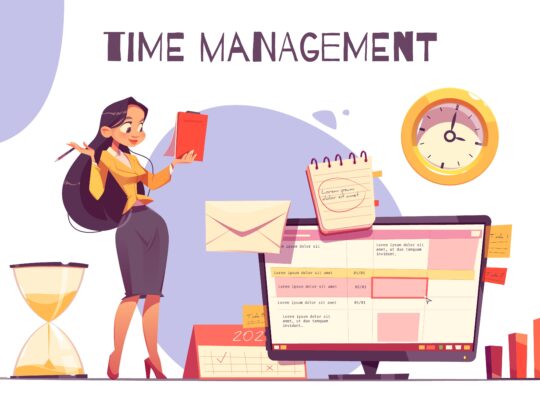| Five Ways To Control Your Time | ||
| Instructor: Chris Croft | ||
| Released: 2/23/2023 | Course Details 1h13m General | |
| Skills Covered Time Management | Course Link | |
| Professional Certifications and Continuing Education Units (CEUs) Project Management Institute – PDUs: 1.5 hour National Association of State Boards of Accountancy (NASABA) – CPE: 2.8 | ||
| Everybody wants more time. While you can’t make more hours in the day, you can find more time for the most important things in your life. In this course, Chris Croft introduces 5 simple time management tips to reduce distractions and stay focused on what matters. The first—saying no—is simple in theory, but hard in practice. Chris explains how to reclaim the power of “no” to make room for true priority items. The second step, negotiation, allows you to spend less time on unimportant tasks. The third way is to delegate sometimes, and the fourth is improving systems and processes so that repetitive tasks are quickly and easily managed. Last but not least, Chris explains how to overcome perfectionism and nitpicking. He explains how to apply the five methods to all time-stealers, including meetings, interruptions, and more. In the initial chapters, he’ll help you clarify your life and work goals, prioritize to-dos using Eisenhower’s matrix of tasks, and answers questions like “Does working longer hours actually get more done?” The worksheets included with the exercise files will help you apply the lessons to your own work and life, and hone your time management skills—one step at a time. Learning objectives – Discover why you need to make the most of every day. – Assess how to separate important from urgent items. – Define Eisenhower’s matrix of tasks. – Determine how to find more time for important things. – Discover how to say no. – Prepare to negotiate tasks. – Develop your delegation skills to save time. – Improve your systems. Source: LinkedIN Learning | ||
The Importance of Time Management
The objective of time management
Maximize time spent on important things. You can get away with neglecting important things – for a short time. Enjoyment + Achievement.
Important Things in Life and Work
- Where will you spend more time?
- What will you achieve?
The importance of clear goals
If a task does not lend itself to enjoyment or achievement, then it’s not an important goal. I want to spend the minimum time on it.
What do you want to enjoy and achieve at home and at work?
Goals
- Written down
- Specific
- Positive
Why Do Goals Work?
- They set your subconscious in the right direction
- They increase self-discipline and assertiveness
Make the most of every day
If you knew how much time you had left, what would you do differently?
Maximize time spent on important things.
- What will you say no to?
- What will you stop doing?
- What deserves your time?
Prioritizing
What prioritizing really means
Priority – comes from the word prior, meaning doing something before something else.
Establish the difference between urgent and important.
- Something can be important but not urgent – like a 10 year strategy
- Something can be urgent but not important – like dealing with an interruption
Urgent – when do you do the task vs. Important – how long you spend on it
Importance
- Subjective
- Internally located
- Constant
Separate important from urgent tasks
Testing for Importance
- Will it matter in 5 years?
- Will you regret not doing more of it?
- Would you miss it if it were gone?
- If you could delegate this task, would you?
Use Eisenhower’s matrix of tasks to prioritize
- Crisis
- Urgent – drop everything to deal with this right away
- You are doing important things in a stressful way
- Ideally, 10% of your day, maximum
- Hassle
- Urgent but not important
- Spend minimum time on it
- Progress
- Important but not urgent
- Plan and do ahead of time
- This is the essence of time management
- (Un)neccessary Evils
- Not urgent and not important – Delegate it or don’t do it
- Filing for example is not urgent and not very important but still needs to be completed, must in the most efficient and quick amount of time.
The most important box of Eisenhower’s matrix
Progress – if you don’t deal with items in this box, they will shift over to box 1 – Crisis. If you are already more than about 10% in box 1, then the key is to tackle the source of the crisis. Ask yourself “How do I prevent crises?”
- Vision – Set future goals – it’s never important until you realize you are going in the wrong direction
- Systems – Create and improve systems before they turn into a crisis
- People – Train and motivate people – not urgent until it’s too late and has been neglected
Fire fighters – they deal with box 1 – crisis issues and it’s never their fault, it’s always caused by someone else. However, they still spend a considerable amount of time in box 3 dealing with prevention and improving systems (fire alarms, sprinklers, exit routes, fire practice, etc.)
Get more from your life through planning
Planning time can help you enjoy and achieve. Fun actually falls within box 3 – progress as it’s important but not always urgent. Through proper planning you will be able to spend more time working on important and fun things.
Why working longer doesn’t work
If you stay late once, you will get more done. However, staying late consistently does not make you more productive. Work expands to fit the time you have. Working longer hours becomes a crutch for interruptions or not paying attention. Sometimes organizations measure the number of hours people work versus their achievement.
Get more time for important things
The only way to increase the time spent in box 3 (Progress) is to take time away from the other boxes. Mainly, taking away from Box 2, the urgent stuff. As you take items away from Box 2 to shift to Box 3 to plan and improve systems, you might be able to reduce Box 1 by 5% and similarly, box 4 by 5%, meaning more time is gained into Box 3 – Progress
The Five Ways To Control Your Time
Utility Theory of Happiness
Maximize happiness at a systemic level
If you say “no” for 1 hour a week x 52 weeks = you gain 52 hours, a whole working week is gained! Imagine a full week full of interrupted time!
Option 1: Say “no” at work
Is it okay to say no at work? Customers cannot always have what they want. Option 2 is a better option for customers, that’s coming up.
Don’t commit unless you know you can follow through. Beware that a “can-do” culture doesn’t turn into one of “overpromising.”
Option 2: Negotiate the time allotted
- Negotiate when you do it. It does not save you time in total but it gives you more choice on how to organize your time. As an alternative,aAsk, “when do you need it by?” They might provide a time that is farther away on your schedule and works for you. Otherwise, if the time requested does not work, explain you can do it but only on a certain date.
- Negotiate how long you spend on it. You can suggest that you have more time this afternoon unless they need 5 minutes right now. Alternatively, you can say I only have 10 minutes right now but will have more time this afternoon. This allows the requester to determine how quickly they want the time.
- Negotiate the location. This may prevent you from traveling to and from a location. You can let them know that you only have limited time but if they came to you, you would be able to work with them at the requested time.
- Negotiate the responsibility. For example, if you transferred the information to an excel format, I can review it. Alternatively, if you can prepare the slides, I can present it to the customer. If you don’t ask, you don’t receive.
Option 2: Use negotiation tactics to save time
Negotiation Strategies
- Ask for something in return.
- Agree on a priorities list.
- When your boss requests you to do something, ask them where it falls on the priority list. Alternatively, suggest where it would fall on the list and seek understanding or agreement.
- Provide a choice.
- I can either do A or B for you but I can’t fit both in today. Which one would you like to choose? You may also be able to use this for customers.
Combine time-saving tactics to greater success. You can’t use the same tactic for every occasion or every request.
Option 3: Delegate to save time
To gain a week per year, we are looking at delegating 1 hour per week. If you have direct reports, look to them to support you by taking a task off your plate. It’s okay to ask for help from colleagues. Are there tasks you should be delegating?
Option 3: Understand why you avoid delegation
Why don’t most managers delegate enough?
- My people are too busy
- I can do it better – at 90% your standard, does it matter?
- It’s fun and I like doing it
- It takes too long to explain – maybe the first time but afterwards not so much
- It could go wrong – simply checking it before it goes to a customer/supervisor
Benefits of Delegating
- New training
- New accomplishments
- More teamwork
It also allows you to be promoted more easily since you have less dependence on the position or department.
Option 4: Improve your systems
Anything that repeats requires a good system. Systems can save time and stress. For example, a list of what to pack on routine trips or a travel bag containing duplicates of items you typically search to pack on your trips.
List the inefficient ways of working that you want to improve. Recommend “Getting Things Done” by David Allen.
Option 5: Identify perfectionism to save time
Overcome perfectionism. Doing things slightly less well. There’s not enough time in life to do everything perfectly. Less important tasks don’t require perfection.
Overcoming Perfectionism
- Determine what you do too well
- Identify what you want more time for
- Limit your time for unimportant tasks
- Don’t get lost in the details
The trick is to do the important things very well and the unimportant things only well enough.
How to apply time-saving tactics
5 Ways to Control Your Time
- Say no
- Negotiate
- Delegate
- Improve Systems
- Overcome perfectionism
Apply one strategy to your biggest time waster or consider how you can use each of the five options. Remember, you need a mixture of them all, not a magic answer.
| Remember! To experience the full benefit of this guide, I highly recommend you watch the full training session. |






